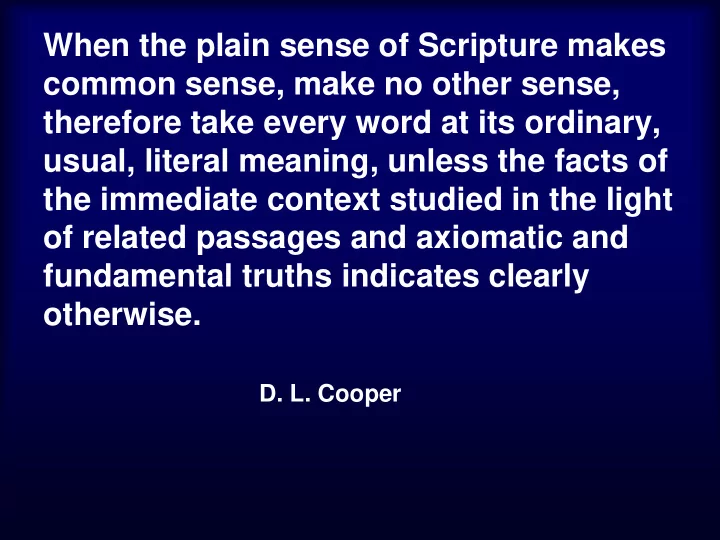

When the plain sense of Scripture makes common sense, make no other sense, therefore take every word at its ordinary, usual, literal meaning, unless the facts of the immediate context studied in the light of related passages and axiomatic and fundamental truths indicates clearly otherwise. D. L. Cooper
“The ribald laughter of the gods at the hapless pair (Aphrodite and her lover Ares) signifies their joy at the cosmic harmony that results from the union of love (Aphrodite) and strife (Ares, the god of war). The passage can also be interpreted metallurgically. Fire (Hephaestus) unites iron (Ares) with beauty (Aphrodite) in the blacksmith’s art.” Heraclitus, The Homeric Problem
Philo (20 BC – AD 54) “That is to say, he [God] filled up that external sense which exists according to habit, leading it on to energy and extending it as far as flesh and the whole outward and visible surface of the body.”
Philo (20 BC – AD 54) “On account of the external sensation, the mind, when it has become enslaved to it, shall leave both its father, the God of the universe, and the mother of all things, namely, the virtue and wisdom of God, and cleaves to and becomes united to the external sensations, and is dissolved into external sensation, so that the two become one flesh and one passion.”
“The allegorical method was not born out of the study of the Scripture, but rather out of a desire to unite Greek philosophy and the Word of God. It did not come out of a desire to present the truths of the Word, but to pervert them. It was not the child of orthodoxy, but of heterodoxy.” J. D. Pentecost
“The Syrian school fought Origen in particular as the inventor of the allegorical method, and maintained the primacy of the literal and historical interpretation.” Bernard Ramm, PBI , 49
“The fundamental criticism of Origen, beginning during his own lifetime was that he used allegorical interpretation to provide a specious justification for reinterpreting Christian doctrine in terms of Platonic philosophy.” Joseph Trigg, Origen
He motivated this view by appealing to the principle of divine inspiration and by affirming that often statements made by the biblical writers are not literally true and that many events, presented as historical, are inherently impossible. Thus only simple believers will limit themselves to the literal meaning of the text. Diprose, Israel , pp. 87–88.
“…made allegory the dominant method of biblical interpretation down to the end of the Middle Ages… It took no genius to recognize that such allegory was a desperate effort to avoid the plain meaning of the text, and that, indeed, is how Origen viewed it.” Trigg, Origen , 121
“The trials and tribulations the world must endure before the second coming symbolize the difficulties the soul must overcome before it is worthy of union with the Logos. The imminence of the second coming refers to the imminent possibility, for each individual, of death. Perhaps more radically, the two men laboring in a field, one of whom is taken and the other left when the Messiah comes represent good and bad influences on a person’s will, which fare differently when the Logos is revealed to that person.” Trigg, Origen
An attitude of contempt towards Israel had become the rule by Origen’s time. The new element in his own view of Israel is his perception of them as “manifesting no elevation [of thought].” It follows that the interpreter must always posit a deeper or higher meaning for prophecies relating to Judea, Jerusalem, Israel, Judah and Jacob which, he affirms, are “not being understood by us in a ‘carnal’ sense.” Diprose, Israel
In Origen’s understanding, the only positive function of physical Israel was that of being a type of spiritual Israel. The promises were not made to physical Israel because she was unworthy of them and incapable of understanding them. Thus Origen effectively disinherits physical Israel. Diprose, Israel , p. 89. (emphasis original)
Recommend
More recommend